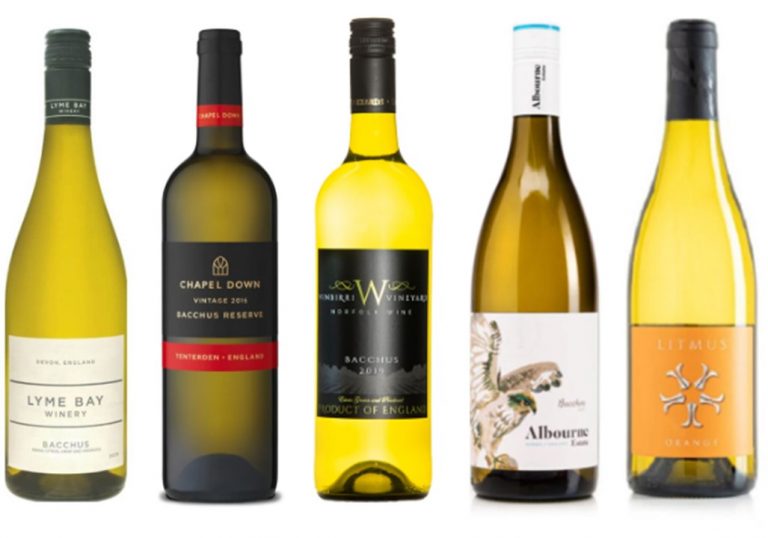This is something I’ve been pondering for a while now, ever since tasting my first English Bacchus some years ago. Since then, the quality (and quantity) has improved exponentially, and I have real hope that this variety could be a breakout star for the English still wine scene.
What is Bacchus?
First up then, an explanation of the name: I mean who names a grape after the Roman god of wine? This isn’t rhetorical, the man in question was Peter Morio a viticulturalist at the Geilweilerhof Institute who ‘created’ this white grape in 1933. Quite ironic then that this great English hope was bred in Germany from a Silvaner x Riesling crossing and Muller-Thurgau (itself a cross of Riesling and Madeline Royale).
The Opportunity for Bacchus
It was widely believed that grapes could only be successfully grown in countries with latitudes falling between 30-50°. As England falls outside of this it is considered ‘high-latitude’ – with a climate too cold to successfully ripen many grape varieties. [Note: Sparkling wine is slightly different in that wines with lower alcohols and higher acids are desirable as the base wine prior to the second fermentation.] But for still wines, our inclement climate can be an issue, which is why so many crossings, and cooler-climate varieties were initially planted. Global warming is beginning to change things, but still, here in England, let’s face it folks, we are at the extremes of winemaking so we need grapes that can grow well in more inclement conditions (cold/wet!) while still producing decent yields.
Step forward Bacchus, an early ripener able to produce good yields of fruit even when planted in the cooler sites. It’s lack of acidity not an issue in our cool climate where higher natural acidity is achieved. It is also a highly aromatic variety – thanks to the substantial amounts of Terpenes, Pyrazines and Thiols the grape produces (compounds generating perfumed, fruity and green herbal notes).
It has a name that is easy to pronounce – compared to the other Germanic grapes which used to make up so many of our vineyards (thinking of Muller-Thurgau, Reichensteiner, Schönburger, Siegerrebe and Huxelrebe). Bacchus is thus relatively easy to remember, instantly recognisable and more sellable to wine consumers.
But what is really going to make Bacchus our point of difference is what it tastes like.
Aroma/Flavour profile
Bacchus to me is like an English hedgerow on a summer’s day. There is something quintessentially English (despite actually being German!) about this grape. It has a similar zesty pungency that Sauvignon Blanc (particularly those from New Zealand) has, with lots of elderflower florals, leafy green herbal notes redolent of nettles, grapefruit citrus and a touch of crunchy green fruit. Usually crisp and dry with not too much alcohol, Bacchus wines make for a perfect summer sipper.
Could it seriously rival Sauvignon Blanc? Probably not in the greater scheme of things – but there is no doubt it certainly has the potential to offer English still wine a Unique Selling Point, and for consumers brought up on the pungent aromatics of Sauvignon Blanc there are enough similarities to sate even the most ardent Savvy lover.
Producers to look for
There are a number of excellent Bacchus’s on the market with more coming all the time. The winery that put Bacchus on the map was Norfolk’s Winibirri Vineyards which took the wine world by storm a couple of years back, when it won Platinum at the Decanter World Wine Awards.
At a tasting recently I was wowed by the Lyme Bay Bacchus, I’m a big fan of this Devon winery and love their range of wines, with the Bacchus wines particularly outstanding – intensely aromatic with oodles of character – look out for this in my next Wine Club case.
Chapel Down – one of the big players in the English wine scene, this Kent winery produces a number of Bacchus wines, including a single vineyard wine, a sparkling version and a gin produced from distilled Bacchus grape skins.
Albourne Estate – this sustainable Sussex winery produces a number of still English wines including two styles of Bacchus – one vinified as a frizzante.
I should also mention Litmus – this Surrey Winery produce a rather unique ‘orange’ wine made predominantly from Bacchus. Not to all tastes, the 18 weeks on skins imparting tannins, structure and a savoury, nuttiness to complement the fruit and green notes.

I hope this has piqued your interest in this grape, whether still, sparkling, as a gin or an orange wine, the options are endless. This year, given stocks of New Zealand Sauvignon Blanc are in such short supply, why not look closer to home and opt for Bacchus, a wine that truly sings of an English summer.
